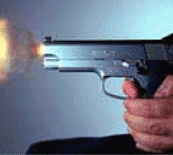 |
|
|
Firearms/Toolmarks
Mission
The Firearms-Toolmarks Unit (FTU) applies valid scientific practices in the forensic
examination of firearms, ammunition components, toolmarks, gunshot residue on
victim clothing, bullet trajectories, and closely-related physical evidence.
The Team
Physical science technicians, physical scientist, physical scientists (forensic
examiner), special agents, ammunition specialist, and management and program
assistant
The Work
Physical Evidence
Examine evidence related to firearms, firearm components, ammunition, ammunition
components, tools, and toolmarks.
Gun Shot Residue
- Examine lead and other metal fragments, shot
wads, shot cups, and bullets removed from bodies at autopsy;
- Examine and microscopically compares bullets
and ammunition components to each other, as well as any other firearms
to determine whether an association exists; and
- Examine evidence in toolmark cases including
screwdrivers, knives, crowbars, saws, chains, human bone or cartilage,
locks, bolts, and screens.
Toolmarks
- Examine and identify a toolmark as having been
produced by a particular tool to the exclusion of all others;
- Perform shot pattern examinations, gunshot
reside examinations, trajectory analysis examinations, and serial
number restorations exists;
- Provide support in investigative and administrative
matters, including the collection, preservation, and processing of
evidence and crime scene reconstruction, both nationally and internationally;
- Serve as liaison with national and international
forensic laboratories;
- Provide extensive training to members of law
enforcement agencies, crime scene personnel, and investigators; and
- Testify in legal proceedings.
Home |



